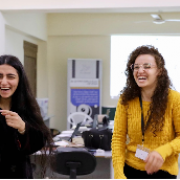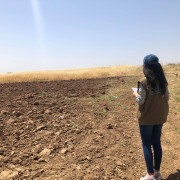Speeches Shim

In June 2014, ISIS took over Mosul, beginning the most dreadful years of Asmaa’s life.
Asmaa, then a junior studying Business Administration at the University of Mosul, was forced to put her studies on hold.

Noor, a high school student living in the town of Bartella in the Ninewa Plains, had her world upended when the so-called Islamic State of Iraq and Syria (ISIS) invaded her hometown of Bartella in August 2014 and forced her and her family to flee. For the first time, Noor found herself living in an internally displaced persons (IDP) camp with her family alongside thousands of strangers. She was homeless, not in school, separated from her friends, and sometimes without enough money to get food and other basics.

Manal is a 22-year-old Kak'ai woman who was raised in a village in the Ninewa Plains in Northern Iraq. Everything changed in 2014 when the so-called Islamic State of Iraq and Syria (ISIS) invaded the Ninewa Plains, and suddenly Manal and her family found themselves homeless, jobless, and their community was displaced. When ISIS committed senseless atrocities against religious and ethnic minorities in northern Iraq, most of the population fled from their ancient homelands. As a result, Manal and most of her community were displaced to a village outside Erbil.

As the so-called Islamic State of Iraq and Syria (ISIS) was beginning to launch attacks on Kirkuk City, Amina* and her family fled and settled in the nearby city of Mosul. Amina enrolled in the electrical engineering program at Mosul University with hopes to work in engineering to support her family, but the subsequent occupation of Mosul by ISIS delayed her studies for more than a year while she was displaced, until after the terrorist group was defeated. When she returned, Mosul University’s College of Electrical Engineering building was still standing, but reeked of gasoline-- a reminder of ISIS’ failed plans to burn it down. “We suffered a lot. But after a lot of suffering from ISIS in Kirkuk and Mosul, I managed to graduate,” Amina said.

When the so-called Islamic State of Iraq and Syria (ISIS) invaded northern Iraq in 2014, Ali Hassan* and his family were forced to flee. Hassan’s hometown of Bashiqa is renowned for its centuries-old tradition of tahini production. His family business, which had been producing tahini for 47 years, was destroyed during the invasion.

Comment
Make a general inquiry or suggest an improvement.